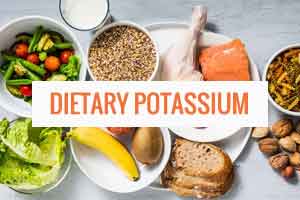- Home
- Editorial
- News
- Practice Guidelines
- Anesthesiology Guidelines
- Cancer Guidelines
- Cardiac Sciences Guidelines
- Critical Care Guidelines
- Dentistry Guidelines
- Dermatology Guidelines
- Diabetes and Endo Guidelines
- Diagnostics Guidelines
- ENT Guidelines
- Featured Practice Guidelines
- Gastroenterology Guidelines
- Geriatrics Guidelines
- Medicine Guidelines
- Nephrology Guidelines
- Neurosciences Guidelines
- Obs and Gynae Guidelines
- Ophthalmology Guidelines
- Orthopaedics Guidelines
- Paediatrics Guidelines
- Psychiatry Guidelines
- Pulmonology Guidelines
- Radiology Guidelines
- Surgery Guidelines
- Urology Guidelines
Dietary potassium regulates calcification of arteries

Reduced dietary potassium intake has been linked to the pathogenesis of a variety of human diseases, including atherosclerosis, diabetes, and chronic kidney disease; all of these disease share common vascular complications, such as vascular calcification.
Yong Sun of University of Alabama at Birmingham and co-researchers have determined a causative link between reduced dietary potassium and vascular calcification in atherosclerosis and uncovered the underlying pathogenic mechanisms that integrate enhanced intracellular calcium influx, activated CREB signaling, and elevation of autophagy. These findings provide molecular insights into the previously unappreciated regulation of vascular calcification and stiffness by low potassium intake and emphasize the need to consider dietary intake of potassium in the prevention of vascular complications of atherosclerosis.The UAB researchers also found that increased dietary potassium levels lessened vascular calcification and aortic stiffness in a mouse model.
Vascular calcification is a risk factor that predicts adverse cardiovascular complications of several diseases including atherosclerosis. Reduced dietary potassium intake has been linked to cardiovascular diseases such as hypertension and incidental stroke, although the underlying molecular mechanisms remain largely unknown. Using the ApoE-deficient mouse model, we demonstrated for the first time to our knowledge that reduced dietary potassium (0.3%) promoted atherosclerotic vascular calcification and increased aortic stiffness, compared with normal (0.7%) potassium–fed mice. In contrast, increased dietary potassium (2.1%) attenuated vascular calcification and aortic stiffness. Mechanistically, reduction in the potassium concentration to the lower limit of the physiological range increased intracellular calcium, which activated a cAMP response element–binding protein (CREB) signal that subsequently enhanced autophagy and promoted vascular smooth muscle cell (VSMC) calcification. Inhibition of calcium signals and knockdown of either CREB or ATG7, an autophagy regulator, attenuated VSMC calcification induced by low potassium. Consistently, elevated autophagy and CREB signaling were demonstrated in the calcified arteries from low potassium diet–fed mice as well as aortic arteries exposed to low potassium ex vivo. These studies established a potentially novel causative role of dietary potassium intake in regulating atherosclerotic vascular calcification and stiffness, and uncovered mechanisms that offer opportunities to develop therapeutic strategies to control vascular disease.
For more details click on the link :

Disclaimer: This site is primarily intended for healthcare professionals. Any content/information on this website does not replace the advice of medical and/or health professionals and should not be construed as medical/diagnostic advice/endorsement or prescription. Use of this site is subject to our terms of use, privacy policy, advertisement policy. © 2020 Minerva Medical Treatment Pvt Ltd